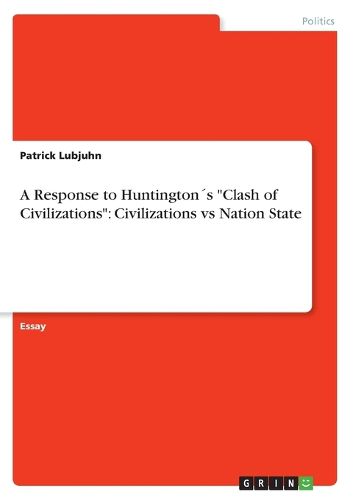Readings Newsletter
Become a Readings Member to make your shopping experience even easier.
Sign in or sign up for free!
You’re not far away from qualifying for FREE standard shipping within Australia
You’ve qualified for FREE standard shipping within Australia
The cart is loading…






Essay from the year 2005 in the subject Politics - Political Systems - General and Comparisons, grade: 1,7, University of Munster, 7 entries in the bibliography, language: English, abstract: Samuel P. Huntington was born in 1927 and is at the moment director of the John- Olin Institute for strategic studies at the University of Harvard. He was the author of an article, first published in the Foreign Affairs magazine, which has, according to Russel, Oneal and Cox ( 2000, p.584) turned into one of the most influential recent books on international relations. This article was called the Clash of Civilizations? and afterwards was extended (in 1996) to his book, called The Clash of Civilizations and the Remaking of the World Order. This book was meant to be seen as a response to his highly polarising and provocative article mentioned above. In it, he tries to give answers to the questions which arose from his article and tries to clarify his standpoints and claims to underpin his thesis. Samuel P. Huntington has given new currency to the notion of a clash of civilizations. His 1993 article on the topic in Foreign Affairs and his book following this article has gained a global audience. Huntington argues that the bipolar division of the world based on ideology is no longer relevant. The world was entering a new period of intense conflict among civilizations. He states: It is my hypothesis that the fundamental source of conflict in this new world will not be primarily ideological or primarily economic. The great divisions among humankind and the dominating source of conflict will be cultural. Nation states will remain them most powerful actors in world affairs, but the principal conflicts of global politics will occur between nations and groups of different civilizations. The clash of civilizations will dominate global politics. The fault lines between civilizations will be the battle lines of the future. (Huntington, 1993, p.22) In trying to understand the causes
$9.00 standard shipping within Australia
FREE standard shipping within Australia for orders over $100.00
Express & International shipping calculated at checkout
Stock availability can be subject to change without notice. We recommend calling the shop or contacting our online team to check availability of low stock items. Please see our Shopping Online page for more details.
Essay from the year 2005 in the subject Politics - Political Systems - General and Comparisons, grade: 1,7, University of Munster, 7 entries in the bibliography, language: English, abstract: Samuel P. Huntington was born in 1927 and is at the moment director of the John- Olin Institute for strategic studies at the University of Harvard. He was the author of an article, first published in the Foreign Affairs magazine, which has, according to Russel, Oneal and Cox ( 2000, p.584) turned into one of the most influential recent books on international relations. This article was called the Clash of Civilizations? and afterwards was extended (in 1996) to his book, called The Clash of Civilizations and the Remaking of the World Order. This book was meant to be seen as a response to his highly polarising and provocative article mentioned above. In it, he tries to give answers to the questions which arose from his article and tries to clarify his standpoints and claims to underpin his thesis. Samuel P. Huntington has given new currency to the notion of a clash of civilizations. His 1993 article on the topic in Foreign Affairs and his book following this article has gained a global audience. Huntington argues that the bipolar division of the world based on ideology is no longer relevant. The world was entering a new period of intense conflict among civilizations. He states: It is my hypothesis that the fundamental source of conflict in this new world will not be primarily ideological or primarily economic. The great divisions among humankind and the dominating source of conflict will be cultural. Nation states will remain them most powerful actors in world affairs, but the principal conflicts of global politics will occur between nations and groups of different civilizations. The clash of civilizations will dominate global politics. The fault lines between civilizations will be the battle lines of the future. (Huntington, 1993, p.22) In trying to understand the causes